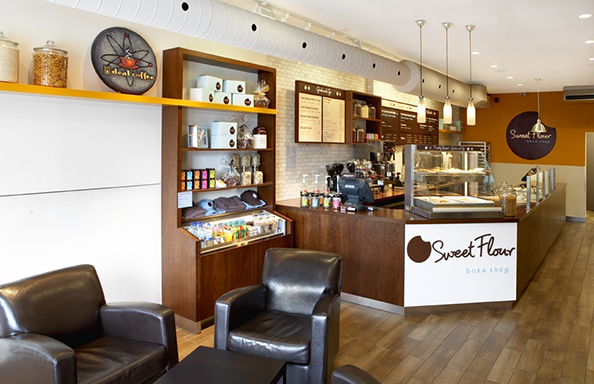Kim Gans had been selling scrumptious cookies from her Sweet Flour Bake Shop in Toronto’s Bloor West Village for almost six years when she decided the economics of maintaining a storefront just didn’t make sense any more. As much as she loved her store, and even aspired to open a second, the time had come to close its doors.

Source: Sweet Flour Bake Shop
It’s not that Sweet Flour’s trademark 2-minute cookie, a customizable concoction baked at high-speed to perfection, wasn’t a hot seller. It’s that the expanding online and catering arms of Gans’ business had long since outgrown its retail presence, which was burdened by hefty rental costs.
“When we finally realized our store was slowing down we spent more time on the online side of the business,” Gans said. “The more we spent online, the more it grew. (Closing the store) allowed us to take the exorbitant rent and re-invest it into supporting the growth of our online business. That helped accelerate our growth significantly, not just from a financial perspective but from a resource perspective.”
In October 2015, Gans closed her store. All of Sweet Flour’s tasty treats are now baked and shipped from its production kitchen a few kilometres to the east, tucked away on a industrial side street opposite some train tracks.
“When we opened our production kitchen (in 2012), we were growing a lot,” Gans said. “The question was ‘Do I open a second store or do I open a production kitchen? While my passion was to open another retail concept, the business economics said ‘No, you have to support your demand of your current customers with another kitchen.’ Trying to do that out of high-rent retail in another store didn’t make sense.”
Recently, Gans experimented with retail again, operating a pop-up kiosk within another store. She’s currently looking for a strategic partner to set up more locations of the same kind, possibly in destination places such as local tourist attractions.
“We’re still trying to figure out what works but we won’t be opening another large format store,” she said. “The rent is too prohibitive.”
Selling cookies and cupcakes online isn’t where Gans expected to end up back when her bake shop made its first sale. She’d always loved the idea of creating a cafe experience for her customers, where she could enjoy their reactions as they bit into one of her freshly baked goodies.

Source: Sweet Flour Bake Shop
“My passion has always been about directly interacting with customers,” Gans said. “Part of the reason I got into this was the way cookies make people smile, how it allows those connections. It’s the nostalgia.”
While she misses her regular walk-in clients, Gans has found social media still keeps her connected to customers, even those who buy online.
“It took me a while to realize you still can interact with your customer in a more meaningful way online than in years past,” she said. “It gives you that one-on-one dialogue, it gives you instant feedback. There’s nothing better than a customer posting a photo of the cookie cake that just arrived at their door. We have always listened to customer feedback and used that as our guide for changes and new product development. ”
Her company’s transition from brick and mortar to online and wholesale bake shop has taught Gans useful lessons about size and scale.
Kim’s advice for small business owners
Facing a crucial decision about what to do next with your small business? Here’s what Kim Gans kept in mind.
Know your numbers
“It’s important to constantly be evaluating your numbers,” said Gans, a former economics major and MBA. Walk-in traffic made up 100% of the business when Gans first opened but shrank to about 35% by the time the store closed. Gans forecast a 10 to 15% drop in sales without a brick and mortar location but growth in online and wholesale “far outweighed” any loss. Sweet Flour’s production kitchen is four times the size of the old store kitchen and costs 80% less to rent.
Don’t be afraid of change
Gans’ passion for the store made her reluctant to deviate from her original dream and close it. However, the move has led to such rapid growth in other parts of her business that she expects to reach $1 million in annual sales for the first time this year.
“Don’t look at change as failure,” Gans said. “For us, change ended up being growth. People will say ‘You’re shutting down, you’re getting smaller.’ In fact, we took a step back to take a step forward and grow. But it takes courage to do that.”
Be willing to let go of sunk costs
Gans had made a considerable financial commitment to renovating her store but realized it wasn’t smart to be tied to those sunk costs.
“I completely gutted the store,” Gans said. “I remodelled it and bought brand new equipment. You can’t get that money back, and it’s not a reason to stay if your growth is somewhere else.”
Now that her orders are being served up online, shipping is an even bigger priority for Kim.
“For us, getting fresh baked cookies to our customers as soon as possible is critical. Canada Post has never let us down doing that”.